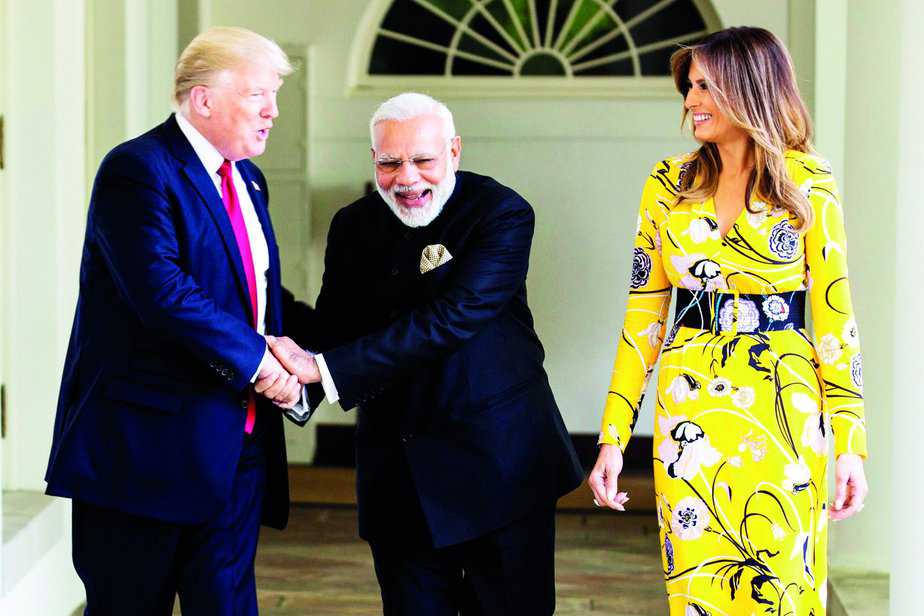The internet has transformed life, and politics is no exception. Bypassing the media, top politicians are using social networking sites to good effect
Social media is in the news for all the wrong reasons. The government has issued a notice to Cambridge Analytica — the company accused of Facebook users’ data breach — demanding a response latest by March 31 on alleged misuse of data to profile Indians and thereby influence their voting behaviour.
These are serious concerns. Transnational social networking sites, as the world learnt the hard way, are not amenable to regulation by nation-states — at least this seems to be so in the case in hand.
The situation becomes ever murkier when top politicians and leaders, custodians of top secrets are active. Over the last decade or so, their dependence on these social networking sites has become considerable. “I sometimes joke that Twitter is what I do instead of smoking,” Garance Franke-Ruta, Yahoo News’ senior politics editor, told Graham Vyse of The New Republic, “It occupies the same interstitial space. I think if Twitter went away, we would all go into withdrawal and have three very uncomfortable weeks — followed by being healthier, happier people.”
In today’s world, a person’s net worth can be judged by the number of followers one has on one of the various social networking sites. Prime Minister Narendra Modi is one of the most followed leaders in the world on Twitter, next only to the US President Donald Trump and the Pope Francis. He has 41.4 million followers; however, a Twitter audit done by Twiplomacy show that more that about 60 per cent of them are actually fake. Modi is not the only one who has a large fake following as per this audit: so do Trump, Pope Francis and King Salman, amongst others. The audit report points out that 51 per cent of Arvind Kejriwal’s 14 million followers are fake, and 69 per cent of Rahul Gandhi’s 6.34 million are fake.
With politicians communicating directly with voters through Twitter and other social networking sites, the role of the media has been challenged. Politicians like Modi and Kejriwal, who have a strong following, don’t need media to communicate their ideas, policy initiatives and engagements with the people. Moreover, they can now sling mud on their adversaries on social media in an effective manner.
Take the case of the current war of words between Congress president Rahul Gandhi and a host of BJP leaders. In a recent tweet, Rahul Gandhi said, “My name is Narendra Modi. I am India’s Prime Minister. When you sign up for my official App, I give all your data to my friends in American companies. PS. Thanks mainstream media, you’re doing a great job of burying this critical story, as always.” And with it shared a link of a story titled ‘Data theft at PM Modi’s doorstep…’ Ever since, Rahul Gandhi has been active on Twitter. He has been able to communicate better with the masses at large and to irritate BJP leaders, says a close aide.
Prime Minister Modi, on his part, who has been equally caustic in his attacks on the Congress party, recently tweeted, ‘Congress is giving nation to foreigners. Most parties opposed FDI but due to sword of CBI, some didn’t vote & Cong won through back door!’
Not just this, people — the electorate at large — have an opportunity to get directly in touch with their leaders. And the leaders have an opportunity to elaborate on various policy initiatives and steps taken by the government. For example, Donald Trump recently announced the appointment of John Bolton as his third National Security Advisor in the last one year on Twitter. Bolton is in the news for describing Pakistan as “a terrorist country with nuclear weapons” akin to “Iran or North Korea on steroids right now.”
Not just this, Trump, recently employed Twitter to start the search for a new lawyer to represent him in special counsel’s Russian investigation. This was after John Dowd resigned as the one of the attorneys representing him in the investigations into ties between the president’s 2016 campaign team and Russia. He tweeted, ‘Many lawyers and top law firms want to represent me in the Russia case…don’t believe the Fake News narrative that it is hard to find a lawyer who wants to take this on. Fame & fortune will NEVER be turned down by a lawyer, though some are conflicted. Problem is that a new lawyer or law firm will take months to get up to speed (if for no other reason than they can bill more), which is unfair to our great country — and I am very happy with my existing team. Besides, there was NO COLLUSION with Russia, except by Crooked Hillary and the Dems!’
The open dialogue on Twitter has become a potent political tool. No politician can afford to ignore Twitter or other social networking site. Arvind Kejriwal started early and reaped benefits. He rather forthrightly typed: ‘Modi is a coward and a psyc(h)opath’ in 2015, this was retweeted more than 28,00 times. Rahul Gandhi is active now, learning the ropes.
“If pornography is about the naked, grunting body, Twitter is about the naked, grunting brain. It’s whatever pops out. And what pops out is altogether too revealing,” writes Bret Stephens in New York Times and adds, “Twitter doesn’t merely amplify ugliness. It erases nuance, coarsens thought…It also facilitates a form of self-righteous digital bullying and mob-like behaviour that can wreck people’s lives.”





